Paving the Way in Science
Mia Morris
' We must forever conduct our struggles on the high plane
of dignity and discipline' �..
Dr Martin Luther King Junior
'The seeming endemic poverty and poor quality of life
in Black communities will only be overcome when your young
people have professional mobility beyond the limited stereotypical
professions of sports, music and the arts.'
Dr Liz Rasekola
Science and scientific endeavour is critical in all of our
lives. Everyday there is an out pouring of information into
our lives. From when we get up in the morning until we go
to bed, we are nurtured and harnessed by this critical body
of work.
The media is dominated by scientific breakthroughs - DNA,
GM foods, vaccines for children, cure for illnesses. The top
employers in the world are primarily the pharmaceutical and
medical companies.
Our young people are keen and eager to learn but need to
develop a good overall understanding and appreciation of Science
Engineering and Technology. The hope is that they will embrace
it in the same way that they are about design and technology
and performing arts.
This article aims to give you insight to people who are working
across frontiers and are delivering pioneering exciting and
innovative solutions.
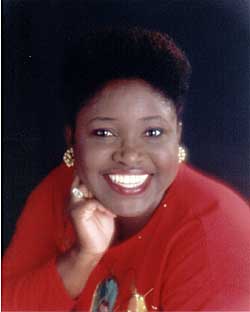 Dr.
Elizabeth Rasekola is a chemical engineer, with 18 years work
experience in industry, both in her native country, Nigeria,
and currently in the United Kingdom. She has had a long-standing
interest in the education of African-Caribbean students, particularly
in Maths, Science and Technology and is the founder of the
UK-based African-Caribbean Network for Science & Technology. Dr.
Elizabeth Rasekola is a chemical engineer, with 18 years work
experience in industry, both in her native country, Nigeria,
and currently in the United Kingdom. She has had a long-standing
interest in the education of African-Caribbean students, particularly
in Maths, Science and Technology and is the founder of the
UK-based African-Caribbean Network for Science & Technology.
One of the reasons that Dr Rasekoala set this up was because
as she puts it
'The seeming endemic poverty and poor quality of life in Black
communities will only be overcome when your young people have
professional mobility beyond the limited stereotypical professions
of sports, music and the arts'.
�
She is also the initiator/developer of the Ishango Science
Clubs and the RESPECT Campaign. The African-Caribbean Network
for Science & Technology is a national educational charity
(NGO), set up in 1995 by Black professionals working in the
various fields of Science, Engineering and Technology (SET),
to advance the educational achievements and career aspirations
of Black youth in these fields, where Blacks are very much
under-represented, due to the inequalities of their educational
outcomes in mainstream education in Britain.
Dr Rasekola says that the 'SET fields provides ample opportunity
for Black youth to enhance their life chances and opportunities,
by working in professions, which are highly paid, internationally
mobile and provide lifestyle-enhancing benefits. '
Dr Rasekola is adamant that: 'Underpinning this under-representation
in SET careers is the educational attainment of Black youth
in Science and Maths subjects in the school system. The current
underachievement of Black youth in these subjects, is a profound
challenge to the education system and Black parents. For their
part, Black parents have to engage more effectively and assertively
with schools and teachers in order to change the dynamics
of the classroom environment for their children. They also
need to provide leadership to their children through demonstrating
in their own lives, their commitment to educational advancement,
literacy and numeracy. There is no point in exhorting your
children to read, for example, when they never see you reading
yourself, or when there are no books in your home.
The challenge as she puts it is not just in the UK but globally
hence her work in setting up initiatives in South Africa,
to support the drive to enhance Public Understanding of Science,
and the educational attainment in Maths, Science & Technology,
of South African youth.
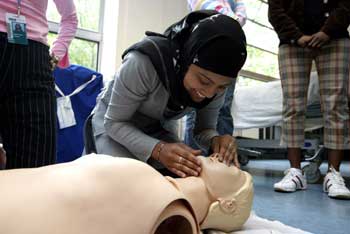
Young people visit the Midwifery section of City University
For her part, the challenge of the under-representation of
Blacks in SET, was one which she decided with the support
of others to address, through setting up the African-Caribbean
Network for Science & Technology (ACNST). The ACNST has
been working nationally through groundbreaking initiatives
such as the National RESPECT Campaign, and the Ishango Science
Clubs, to raise the attainment and career aspirations of Black
youth in SET subjects and fields.
The Ishango Science Clubs provide Black youth with a supportive
environment in which to engage and sustain their motivation,
interests and goals in SET. Many young people who have passed
through the Clubs have gone on to university to undertake
SET courses. A key factor in the success of the National RESPECT
Campaign and the Ishango Science Clubs, has been the opportunity
for Black youth to interact with Black SET role models. This
has enabled the youth to challenge the stereotypical expectations
of them from schools, the media, and British society in general.
When Black youth see role models who look like them, it sends
a powerful and affirming message that they can achieve, too.
The key features of the National RESPECT Campaign (2000-2001)
will involve high profile poster launches/conferences and
school/community based promotional activities involving Black
SET professionals as role models in Manchester, Sheffield,
Wolverhampton, Bristol, Northampton and London.
Another key aspect to the engagement of Black people with
science is that of science and society debate, communication
and ethics. The public debate and discourse on challenging
scientific breakthroughs such as GM food, cloning, etc, should
not just be limited to the white middles classes in Britain.
Black communities must be engaged in this debate, and contribute
their perspectives, concerns and vested interests, which are
just as valid as those of other groups in society. It is in
order to counteract this marginalisation of the voices of
Black communities in science and society debate, that we have
launched with funding from government, the Delivering Inclusion
in Science Communication (DISC) project, to bring ethnic minority
communities into the mainstream of scientific debate.
ACNST are running a national mapping of activities, needs,
barriers and interests of BME organisations with regard to
Science Communication/Promotion, and science issues. The under-representation
of ethnic minority communities in science communication/promotion
and science and society debate in Britain, is particularly
profound, and the African-Caribbean Network for Science &
Technology (ACNST) and the British Association for the Advancement
of Science (the BA) .
A number of activities have been planned this Autumn in Birmingham
Manchester and London organized by the network and the British
Association for the Advancement of Science and is co- ordinated
by consultants. The Delivering Inclusion in Science project,
aims to bring together over a two year period the Black Minority
Ethnic voluntary sector and Science Communication Companies
and specialist so that there can be a dialogue and also build
good sustainable and mutual relationships.
Whilst we sometimes get into a rut with hearing that we do
not have any role models especially men from the Caribbean
community. It was nice to hear of the achievements of Dr Donald
Palmer who is a Lecturer in Immunology at the Royal Veterinary
College, University of London and an Honorary Lecturer at
Imperial College, London. Dr Palmer is also a Visiting Lecturer
at Wolverhampton and Cambridge, Universities. Donald attended
Ernest Bevin School Tooting; he left with CSE's and went to
university after studying an Ordinary National Diploma in
Medical Sciences at South London College.
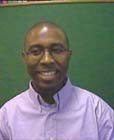 He
did his undergraduate studies at Bradford University, his
postgraduate (MSc in Immunology) studies at King's College
London and obtained his PhD at the Medical Research Council
Clinical Science Centre, Northwick Park Hospital. Prior to
his appointment at the RVC, Donald spent several years as
a post-doctoral research fellow in the laboratories of Imperial
College, London and Imperial Cancer Research Fund (now known
as Cancer Research UK). Truth be known Donald was hooked into
Science at an early age. 'I had a paper round primarily so
I could get my hands on Marvel comics, I simply loved Silver
Surfer, X-Men, Black Panther but my favourite hero was Spiderman
(incidentally, Peter Parker is a scientist). My parents supported
my interest and bought me a chemistry set for my 13th birthday.
"Rather ironically, I spend a fair amount of time in
the laboratory now''. He
did his undergraduate studies at Bradford University, his
postgraduate (MSc in Immunology) studies at King's College
London and obtained his PhD at the Medical Research Council
Clinical Science Centre, Northwick Park Hospital. Prior to
his appointment at the RVC, Donald spent several years as
a post-doctoral research fellow in the laboratories of Imperial
College, London and Imperial Cancer Research Fund (now known
as Cancer Research UK). Truth be known Donald was hooked into
Science at an early age. 'I had a paper round primarily so
I could get my hands on Marvel comics, I simply loved Silver
Surfer, X-Men, Black Panther but my favourite hero was Spiderman
(incidentally, Peter Parker is a scientist). My parents supported
my interest and bought me a chemistry set for my 13th birthday.
"Rather ironically, I spend a fair amount of time in
the laboratory now''.
His main area of research is trying to understand how the
immune system develops. His work has been published in international
and national scientific journals. His other major commitment
is teaching and he is involved in the organizing, teaching
and the supervision of students both at the undergraduate
and postgraduate level.
Throughout his career he has been awarded various accolades
and was recently a recipient of an Excellence in Teaching
Award from Imperial College, London. He regularly gives time
locally to mentor and support young people (his major message
is 'self determination') plus love, organizing innovative
activities, demonstrating to young people how Science can
make a difference in their lives. 'More of our young people
have the aptitude but I suspect are reluctant to show their
true interest, as they do not want their peers seeing them.'
This subject area covers such a broad spectrum, from the
obvious such as Medicine to understanding how the environment
works. Naturally it influences our lives and so it is important
that our community are aware of the many scientific developments.
Moreover, you really cannot lose by studying Science'. Dr
Palmer goes on to stay the teaching of Science can often be
tricky as there is concern raised in various quarters in regards
to the fact that so few teachers select Science.
Hence one of the reasons that the government has introduced
golden hellos to graduates wanting to teach Maths or Science.
David Bromfield, journalist, broadcaster and teacher taught
in Lambeth for a number of years until he got the opportunity
to platform his abilities by winning the BBC Talent contest.
As a result he worked on Tomorrow's World, BBC Byte size and
presented on BBC London as the Science and Education correspondent.
David is now appointed as Deputy Head of Urseline High School
Wimbledon, 'I will still keep both careers going as it is
important that young people are able to get a better understanding
of the role of Science in all aspects of our lives. The most
important Science breakthrough is around ante natal, and pediatrics
as I have a young family and have benefited personally from
these services..
'When I teach Science and present information as a journalist
, I always try and make the information as relevant and as
interesting as possible as I want young people to explore
and investigate and develop a thirst for knowledge.'
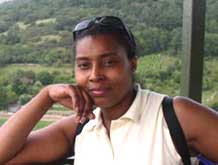 Sonji
Clarke works at St Thomas as a senior consultant in gynecologist
and obstetrician young people need to look after their health
and well being, they also need to be supported and nurtured.
I always had an interest in Science as a child, I remember
having a doll at a young age and wanted to explore more about
my doll I wanted to know how they got it to talk and move. Sonji
Clarke works at St Thomas as a senior consultant in gynecologist
and obstetrician young people need to look after their health
and well being, they also need to be supported and nurtured.
I always had an interest in Science as a child, I remember
having a doll at a young age and wanted to explore more about
my doll I wanted to know how they got it to talk and move.
'I feel that significant breakthroughs in medicine probably
relate to new and improved diagnosis and treatment of cancers.
The sexy stuff, though is in molecular biology, gene manipulation
and the human genome project as that impinges on all areas
of medicine, probably. Cure for HIV and the other deadly viruses
(eg Ebola) are also important. The important things that parents
can do are:
- Cooperate with the school and their science curriculum.
Discuss what the children are learning at home.
- Help the children to understand that science and technology
are all around them, whether it's cooking or how the computer
or car works. Even cultivating plants and vegetables or
looking at bugs in the garden.
Just to think she goes on say 'if science was ignored, the
things that we now take for granted would never have been
invented. The light bulb, telephone, computers. Electricity,
aeroplanes. Consider the effect of global warming. Animal
conservation or plant conservation. The study and prediction
of earthquakes etc. The list is endless. Science is exciting
AND FUN!
I am involved with my local church and have been for some
considerable time so I am able to give a hand when and where
possible in encouraging young people to look at this field
of work, and I know that I am a good example. I was able to
speak to a group of young people from schools in Lambeth and
shared with them my story and experiences, it was an enjoyable
and worthwhile experience especially as maybe one day we will
see some young people training to be Doctors via the Access
to Medicine scheme run by Kings College.
In all of this, my most positive influence has been my mum.
All of my family, my brother and my sisters are high achievers,
when we all could so easily have been another set of statistics.
I believe you should go for your dreams. Stretch yourself.
The sky is the limit as long as you don't limit yourself!'
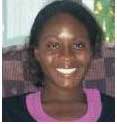 We
close the article with wise words from 25 year old Yaa Adjei
a freelance Science writer and curriculum facilitator, she
regularly writes on issues in relation to the field. An Imperial
College graduate with a M.Sc., Science Communication Masters.
'The Science Communication course has enabled me to understand
the origins of Scientific thought, ethics and controversy.
I also learned how science, the public and media interact
and how current issues that affect society are handled. This
course has enabled me to gain insights into the world of print
journalism and produce news and feature articles. I also learned
the importance social and political influences of national
and international policy formation. We
close the article with wise words from 25 year old Yaa Adjei
a freelance Science writer and curriculum facilitator, she
regularly writes on issues in relation to the field. An Imperial
College graduate with a M.Sc., Science Communication Masters.
'The Science Communication course has enabled me to understand
the origins of Scientific thought, ethics and controversy.
I also learned how science, the public and media interact
and how current issues that affect society are handled. This
course has enabled me to gain insights into the world of print
journalism and produce news and feature articles. I also learned
the importance social and political influences of national
and international policy formation.
I think it is important for young people to have an awareness
of how the world around them works. Science is not unconnected
from real life - it forms an integral part. I think it is
important for people to be aware of the influences scientific
advancement have on our everyday lives. People should gain
an informed opinion in areas of science, for example Nutrition
and Healthcare. When a Scientific controversy occurs, the
problem facing people is deciding whom to trust, and finding
the ways to evaluate different points of view.
I knew from a very young age that I wanted to work in Science
as 'there are so many career opportunities within science,
it is important to find out about the choices, before making
a decision. Working within the scientific arena helps a person
enhance their research skills. Having good research skills
is useful for everyday life, especially since we are living
in a technological multi-choice age. The skills gained within
learning scientific disciplines help people make informed
opinions.'
The area of work in Science I work in is very exciting and
has a promising future � 'I work within Science Communication
and the world of Science Communication is steadily growing.
I hope parents and young people will read this article and
consider how best to take advantage of the free tourist attractions
available, including the Science Museum, for inspiration.
Having access to encyclopaedias or general knowledge books,
or even parent controlled Internet sites with online science
education enrichment activities. The Planet Science, and BBC
education websites are examples. More info on www.ishangohouse.com;
www.wellplaced.co.uk;
www.rvc.ac.uk;
www.kcl.ac.uk/accesstomedicine
|




